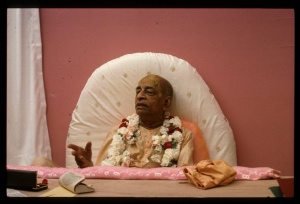SB 12.1.39-40: Difference between revisions
No edit summary |
(Vanibot #0054 edit - transform synonyms into clickable links, which search similar occurrences) |
||
| Line 28: | Line 28: | ||
<div class="synonyms"> | <div class="synonyms"> | ||
''[//vanipedia.org/wiki/Special:VaniSearch?s=strī&tab=syno_o&ds=1 strī]'' — of women; ''[//vanipedia.org/wiki/Special:VaniSearch?s=bāla&tab=syno_o&ds=1 bāla]'' — children; ''[//vanipedia.org/wiki/Special:VaniSearch?s=go&tab=syno_o&ds=1 go]'' — cows; ''[//vanipedia.org/wiki/Special:VaniSearch?s=dvija&tab=syno_o&ds=1 dvija]'' — and ''brāhmaṇas''; ''[//vanipedia.org/wiki/Special:VaniSearch?s=ghnāḥ&tab=syno_o&ds=1 ghnāḥ]'' — the murderers; ''[//vanipedia.org/wiki/Special:VaniSearch?s=ca&tab=syno_o&ds=1 ca]'' — and; ''[//vanipedia.org/wiki/Special:VaniSearch?s=para&tab=syno_o&ds=1 para]'' — of other men; ''[//vanipedia.org/wiki/Special:VaniSearch?s=dāra&tab=syno_o&ds=1 dāra]'' — the wives; ''[//vanipedia.org/wiki/Special:VaniSearch?s=dhana&tab=syno_o&ds=1 dhana]'' — and money; ''[//vanipedia.org/wiki/Special:VaniSearch?s=ādṛtāḥ&tab=syno_o&ds=1 ādṛtāḥ]'' — showing interest in; ''[//vanipedia.org/wiki/Special:VaniSearch?s=udita&tab=syno_o&ds=1 udita]-[//vanipedia.org/wiki/Special:VaniSearch?s=asta&tab=syno_o&ds=1 asta]-[//vanipedia.org/wiki/Special:VaniSearch?s=mita&tab=syno_o&ds=1 mita]'' — switching their moods from elated to depressed and then to moderate; ''[//vanipedia.org/wiki/Special:VaniSearch?s=prāyāḥ&tab=syno_o&ds=1 prāyāḥ]'' — for the most part; ''[//vanipedia.org/wiki/Special:VaniSearch?s=alpa&tab=syno_o&ds=1 alpa]-[//vanipedia.org/wiki/Special:VaniSearch?s=sattva&tab=syno_o&ds=1 sattva]'' — having little strength; ''[//vanipedia.org/wiki/Special:VaniSearch?s=alpaka&tab=syno_o&ds=1 alpaka]-[//vanipedia.org/wiki/Special:VaniSearch?s=āyuṣaḥ&tab=syno_o&ds=1 āyuṣaḥ]'' — and short life spans; ''[//vanipedia.org/wiki/Special:VaniSearch?s=asaṁskṛtāḥ&tab=syno_o&ds=1 asaṁskṛtāḥ]'' — not purified by Vedic rituals; ''[//vanipedia.org/wiki/Special:VaniSearch?s=kriyā&tab=syno_o&ds=1 kriyā]-[//vanipedia.org/wiki/Special:VaniSearch?s=hīnāḥ&tab=syno_o&ds=1 hīnāḥ]'' — devoid of regulative principles; ''[//vanipedia.org/wiki/Special:VaniSearch?s=rajasā&tab=syno_o&ds=1 rajasā]'' — by the mode of passion; ''[//vanipedia.org/wiki/Special:VaniSearch?s=tamasā&tab=syno_o&ds=1 tamasā]'' — and by the mode of ignorance; ''[//vanipedia.org/wiki/Special:VaniSearch?s=āvṛtāḥ&tab=syno_o&ds=1 āvṛtāḥ]'' — covered over; ''[//vanipedia.org/wiki/Special:VaniSearch?s=prajāḥ&tab=syno_o&ds=1 prajāḥ]'' — the citizens; ''[//vanipedia.org/wiki/Special:VaniSearch?s=te&tab=syno_o&ds=1 te]'' — they; ''[//vanipedia.org/wiki/Special:VaniSearch?s=bhakṣayiṣyanti&tab=syno_o&ds=1 bhakṣayiṣyanti]'' — will virtually devour; ''[//vanipedia.org/wiki/Special:VaniSearch?s=mlecchāḥ&tab=syno_o&ds=1 mlecchāḥ]'' — outcastes; ''[//vanipedia.org/wiki/Special:VaniSearch?s=rājanya&tab=syno_o&ds=1 rājanya]-[//vanipedia.org/wiki/Special:VaniSearch?s=rūpiṇaḥ&tab=syno_o&ds=1 rūpiṇaḥ]'' — appearing as kings. | |||
</div> | </div> | ||
Latest revision as of 20:56, 17 February 2024

A.C. Bhaktivedanta Swami Prabhupada
Please note: The synonyms, translation and purport of this verse were composed by disciples of Śrīla Prabhupāda
TEXTS 39-40
- strī-bāla-go-dvija-ghnāś ca
- para-dāra-dhanādṛtāḥ
- uditāsta-mita-prāyā
- alpa-sattvālpakāyuṣaḥ
- asaṁskṛtāḥ kriyā-hīnā
- rajasā tamasāvṛtāḥ
- prajās te bhakṣayiṣyanti
- mlecchā rājanya-rūpiṇaḥ
SYNONYMS
strī — of women; bāla — children; go — cows; dvija — and brāhmaṇas; ghnāḥ — the murderers; ca — and; para — of other men; dāra — the wives; dhana — and money; ādṛtāḥ — showing interest in; udita-asta-mita — switching their moods from elated to depressed and then to moderate; prāyāḥ — for the most part; alpa-sattva — having little strength; alpaka-āyuṣaḥ — and short life spans; asaṁskṛtāḥ — not purified by Vedic rituals; kriyā-hīnāḥ — devoid of regulative principles; rajasā — by the mode of passion; tamasā — and by the mode of ignorance; āvṛtāḥ — covered over; prajāḥ — the citizens; te — they; bhakṣayiṣyanti — will virtually devour; mlecchāḥ — outcastes; rājanya-rūpiṇaḥ — appearing as kings.
Translation and purport composed by disciples of Śrīla Prabhupāda
TRANSLATION
These barbarians in the guise of kings will devour the citizenry, murdering innocent women, children, cows and brāhmaṇas and coveting the wives and property of other men. They will be erratic in their moods, have little strength of character and be very short-lived. Indeed, not purified by any Vedic rituals and lacking in the practice of regulative principles, they will be completely covered by the modes of passion and ignorance.
PURPORT
These verses give a concise, accurate description of the fallen leaders of this age.